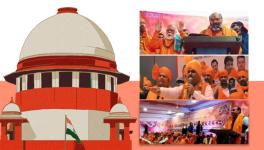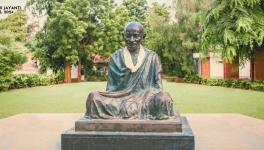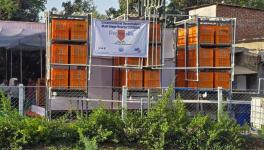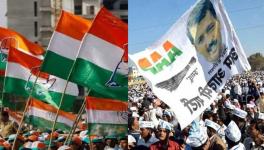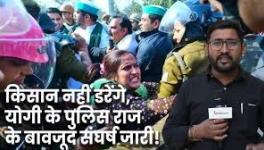Charul & Vinay: They Sing For Lost And Forgotten People In Gujarat
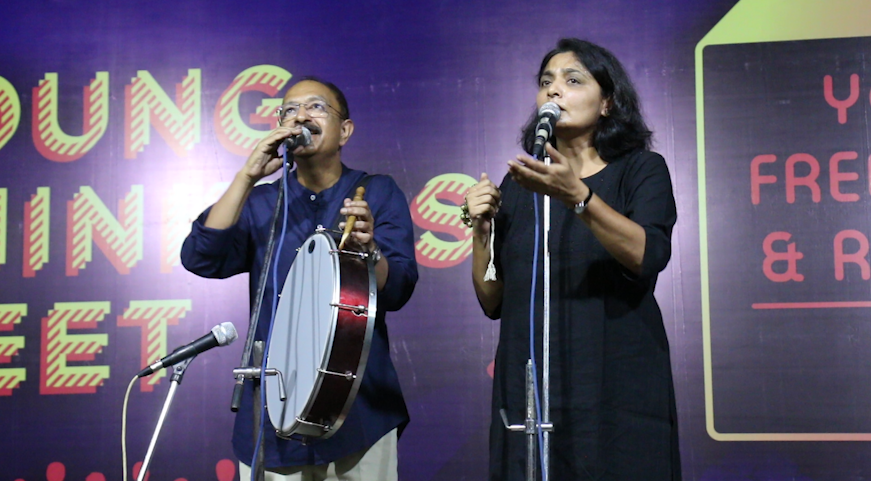
In the din of marching boots and clashing cymbals of ‘development’ small voices of those at the margin, those who are bypassed by the juggernaut of ‘vikas’ are often ignored and forgotten. This has happened in Gujarat too with pastoral communities, migrant labourers, construction workers, fishing community, salt-makers, shepherds and others tragically losing their voice, as if they don’t exist. The space for dissent and difference, both have shrunk and squeezed out.
But in Charul Bharwada and Vinay Mahajan, these lost people – or at least their voices – have found saviours. They have left their life of prosperity to write songs and put to poignant music the stories of the marginalised communities.
Charul Bharwada an architect and planner and Vinay Mahajan was a management professional. Both were successful in their careers, far away and insulated from the world of misery and tragedy. Both were involved in music.
Then they decided to raise a voice for the voiceless through their fiery and catchy songs of hope that are based on their humbling field experiences. Simple lyrics, stirring compositions and minimal instrumentation lend an earthy feel to their music.
'Loknaad'
Their group is called ‘Loknaad’ (people’s voices), which was formed 15 years ago when Gujarat was rocked by the worst genocide. In that atmosphere of fear and crackdown on all dissenting voices, which appears to be continuing even today, the duo came together sharing “similar concerns and interests”.
Considered one of its kind, their “progressive music band” or “progressive cultural space” is trying to revive the waning sensitivity and dignity. It works on the issues of peace, dignity and democracy through reflective music, peace products and educational workshops. Their songs are accompanied by rustic instruments. Vinay plays the dafli (hand drum) and Charul vibrates the ghungroo (small metallic bells strung together).
The subjects that their songs cover deal with any kind of injustice faced by people, be it farmer suicides, starvation deaths, religion or livelihood based atrocities, border dispute generated violence, gender issues and such.
Alternative lifestyle by choice
Both Vinay and Charul are professionals who have made a conscious choice to take up the cause of common and marginalised people. They have been doing research on livelihood issues of pastoral communities, migrant labourers, construction workers, fishing community, salt-makers, shepherds and others. Through their ground research, they came to know about the hardship faced by these communities, which are conveniently ignored by political parties even during election campaigns.
“There so many issues related environment. Our grasslands are being lost to development, our rivers are drying, the forests are being cut and the soil is eroding. For each depleting resource, the dependant community is being drastically affected. This is not only an environmental problem but an issue of livelihood and survival,” Vinay, who composes the songs and pens lyrics together with Charul, told NewsClick on the sidelines of ‘Young Thinkers Meet 2017’ organised by the state civil society groups at Ahmedabad.
The “music loving couple” communicate their research findings to the largest section of society. According to them, “Music is the best medium apart from seminars and presentations.”
"Our effort is to bring out the issues of day to day lives of people through our studies and music so that we as collective bring dreaming and thinking of a better tomorrow," said Charul.
“When we talk about Gujarat, only flourishing business comes in mind. But there are so many unheard, unseen and neglected but extremely talented communities live here. When think of tribals, Jharkhand comes in mind. But tribals constitute 13% (around 70 lakh) of the total population of Gujarat. When we think of salt, Maharshtra comes in mind. But Gujarat contributes 75% of total production of salt in the country. While talking about coastal regions and fisher community, states like Kerala, Maharashtra, Goa come in picture but Gujarat has 1,600 km of sea coast. Unfortunately, their concerns are never raised and they are forced to live a pathetic life. They are voiceless people,” Vinay said.
Charul is concerned about the shrinking space for dissent but says they dare to speak. “We have not faced any kind of problem so far in performing and registering our dissent. Yes, there are problems which are dangerous for a society to flourish. But still there is hope, which gives us positivity. We are performing here only because there is space left,” she said.
Asked about how society changed after the communal violence in 2002 in Gujarat, she said it was very much visible that something untoward will happen in future. “But we as a society failed to foresee it. It had horrified us when we saw a sticker saying ‘Garv Se Kaho Hum Hindu Hain’ (say with pride that we are Hindus) on the wall of our house. The riots divided society on religious lives and it is still visible. It damaged the social fabric and internal community harmony which can still be seen on the ground,” she said.
Though their music supports all ongoing people’s struggles and issues, but Charul has complaints with the civil society. “Why do they only come forward when such violence takes place when there is need to work on the ground with consistency?” she asks.
Vinay speaks with a conviction of one who has felt and touched the issues at the grassroots. He says that violence gets defined very narrowly now. It is only inflicted by a terrorist or a war and it’s only visible violence that is talked about. “But the larger scale violence is not even categorised as violence. Farmers end their lives because a policy has been changed, children die of starvation and infant mortality, all these are invisible violence, violence of insensitivity,” he said.
The rewards for this kind of populist work are aplenty. Charul recalls going for a meeting to Chattisgarh where they sat in the audience and were surprised to hear three tribal women sing one of their songs on stage. “That was really a reward. We have not taken our music to any commercial channel. We say our songs have their own wings, their own flight independent of us. It will reach the people who need it.”
Get the latest reports & analysis with people's perspective on Protests, movements & deep analytical videos, discussions of the current affairs in your Telegram app. Subscribe to NewsClick's Telegram channel & get Real-Time updates on stories, as they get published on our website.









